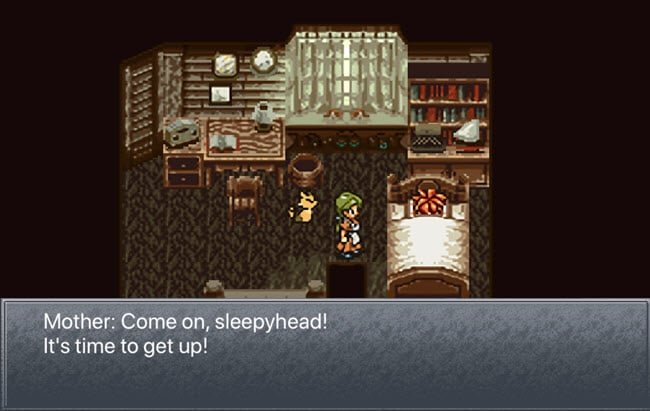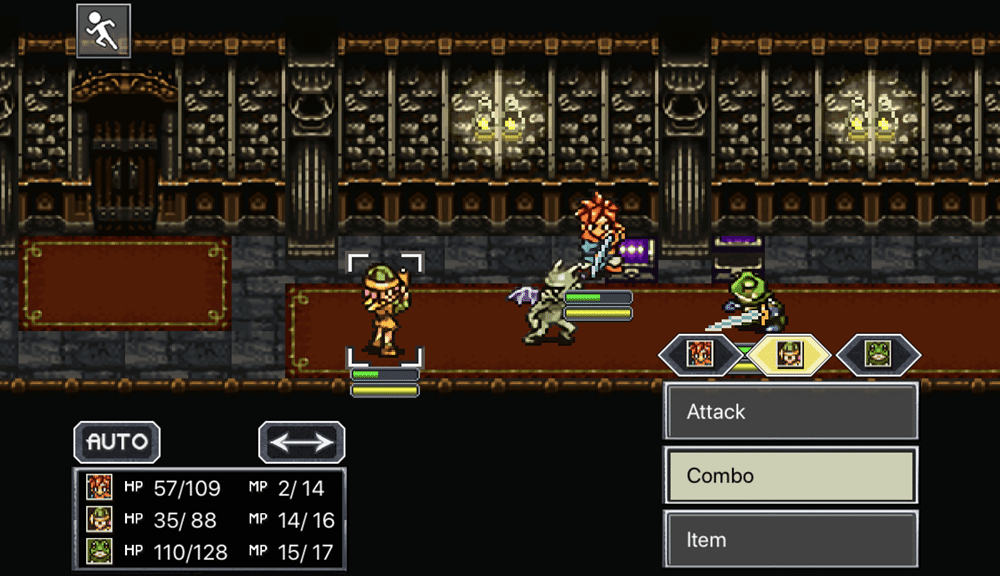Be sure to continue the fun with our Chrono Trigger 25th Anniversary Celebration by checking out all our other posts.
Disclaimer: A digital review copy of this book was provided by Boss Fight Books, and the reviewer has independently purchased an additional copy.
I have loved Boss Fight Books ever since I was sent an ARC of Chris Kohler's book on Final Fantasy V. With us here at Geek to Geek doing our Chrono Trigger 25th Anniversary Celebration, the folks at BFB were gracious enough to send a copy of Michael P. Williams' book on Chrono Trigger for us to include as part of our Chronostravaganza.
Reading through the book, it strikes me at how different each of the Boss Fight Books are. Some are playful (Earthbound), others are informative and autobiographical (Final Fantasy V, Resident Evil), and others lean more academic, which is where Williams' look at Chrono Trigger lands.
That tends to be okay by me since I have a background in academics, and he writes about the game using ideas about storytelling and narrative archetypes from Joseph Campbell and Carl Jung — both of which were major parts of my research during my time as a student and professor.
Either way, like all the other Boss Fight Books I've read, this one is definitely worth reading.
The Good
By far, hands down, the best part of this book is when Williams is talking about the translations of CT. Because the game has been around and beloved for so many years, it has also been ported to different systems and platforms.
And as it has been done, the need for a better (different?) translation has arisen.
He discusses the SNES version and the DS version (the mobile ports use the DS translation) and why certain choices were made, both on a word-by-word level and an overall narrative basis. If you're even remotely interested in language and translation, you'd do well to read the CT Boss Fight Book for that aspect alone.

Williams goes into interviews with the translators for the game and discusses the finer points of making the game what we know and love. As important as the gameplay is (and we all know that Chrono Trigger has some dynamite gameplay), the translation in an RPG like this is even more important.
The book goes into just how hard it can be to grasp the right wording and apply the right themes because translation — especially from two such different languages as Japanese to English — is not word-for-word. It's not 1:1. You have to translate tone and nuance, too, and make it so that it's culturally understandable.
Diving deep into that subject is far and above the highlight of the book for me, but that comes as no surprise. It was what made me adore the Final Fantasy V Boss Fight Book so much, too.
There is a lot to love in this book, and the translation stuff is just the most interesting to me. You get a look at the author's life in Japan, which is super interesting for folks like me who want to gobble up as much of that as we can.
Plus, the book is written in such a way that multiple angles and critical modes are used to tackle different topics. It's definitely literary criticism with the game as a primary text, and I find that fascinating. Williams does this really well, using both theory and personal experiences with Japanese culture and gaming to create a unique look at Chrono Trigger in a way that doesn't get done that often because of how highly regarded the game is in most circles.
The Bad
I'm just gonna say it: Williams' tone throughout this book is kind of pretentious. That's the bad part of the book. When I am reviewing anything, books, movies, tv, games, whatever…I try to look at it from a lot of different angles, try to see why decisions were made, and check my own bias to see why I feel the way I do about something.

Personally, I prefer a casual writing style with a more conversational tone. Especially when it comes to non-fiction. Chrono Trigger‘s BFB wasn't like that. It's like listening to a lecture, more than having a conversation with the author. And that's okay. It just isn't my thing. But since there's no accounting for style or taste, take that criticism with a grain of salt.
Once I got used to that tone, I had no real complaints with the book. The research was spot on, the stories were interesting, and the ties to Williams' experiences in Japan were interesting to read about — especially as someone who wants to travel there and spend time really immersing myself in the culture. He just phrased things in a way sometimes that made me sit back and go…”really?”
The Ugly
I guess my only real beef with the book is this: the digs that Williams takes at Chrono Cross are downright ugly. The game, for those of you who don't know, is a sequel to CT, and it's fairly divisive in how it deals with the narrative and characters from Chrono Trigger. Williams is on the clear other side of the fence as I am when it comes to CC, too. (But that's not the ugly part. That's just a difference of opinion.)
He says, “In the DS version of Chrono Trigger, [. . .] adds a new optional boss and an ending to tie the game more directly with the sequel Chrono Cross,” and that “even if we beat this boss, we still end up defeated.”
He then continues on to say that to him, “a player of the original Super Nintendo version, this new ending is a big screw you. Having our party lose to a boss that we already kind of defeated, and that characters in the sequel are able to defeat, makes it feel like our team — the team that saves the world! — isn't good enough!”
Okay, I get that. You like these characters, feel emotionally attached to the journey and its result. I get that and respect it.

But then he continues on, saying, “furthermore, Chrono Trigger does not need retconning into an unstable Chronoverse just to answer for the poor choices of its sequel.” Which again, I can see where he's coming from. The new boss in the Nintendo DS release of CT was added after-the-fact to tie the games together. I can understand why he sees it as being a slap in the face to the original story.
But I also believe that just because something like this exists, it in absolutely no way devalues the experiences that he or anyone else had with the first one. It doesn't diminish the original narrative. It doesn't ruin what came before. It adds to it, and if you don't want to see that ending or consider that connection…that's fine. Don't do it. That way you won't be offended by it.
Which…is actually where The Ugly part comes in here. Williams says just a few pages after that he didn't even play Chrono Cross, in the first place! So all of that is being offended and complaining based purely conjecture and inference from things he's heard and read.
He talks about various plot points and narrative threads and how they're carried through into the sequel, and then says that we can learn these things and see these things, and i quote, “if we have the wherewithal to play through Chrono Cross — I didn't.”
This is The Ugly. This is the part where I have issue. For someone who writes on such an academic level, looking at the game and narrative from such a high level, to make these claims about the “poor choices of the sequel” and that they are “a big screw you” to the players of the original is wholly out of place. You cannot make an educated criticism of something you have only experienced second or third-hand. Being offended because of hearsay and summary has no place in this type of literary criticism (and that's what Boss Fight Books are — literary criticism with video games as the primary texts).

Like I said, I realize that in any review, there are biases. And in this one, my bias definitely shows based on my background in academics and, well, literary criticism. His bias shows against Chrono Cross, and as someone who has played through the game (both games, technically) multiple times, I find his assertions unfounded and unwarranted given his lack of experience in actually experiencing the narrative.
I think this is a good analogy: it's like if you were writing a review of Game of Thrones, but had only seen the first few seasons and had a friend describe what happens in the rest. By admitting to not having played Chrono Cross, but still making such adamant claims and criticism, it shows bias and ignorance (not in a negative way, but in a denotative way) of the subject.
That reduces credibility for me. And that's why I had to call this part ugly.
Final Verdict
Buy the book. I did. Even before I had been sent the digital review copy by the folks at Boss Fight Books, I had bought myself an ebook copy of it. Because I like it, and I want to support them in the fantastic work they're doing.
Any look at Chrono Trigger is going to be divisive because it's so close to so many people. It's nostalgic, and it's important to the industry, and it's a genuinely good game. But when you get all of that together in a pot with actual literary criticism, there's going to be a reaction.
That's what good criticism does. That's what good books do. They elicit a reaction from the reader in one way or another. CT and CC certainly did that for Michael P Williams, and this book did it for me. That means it was a success, and one that I highly recommend.
While I might not agree with him on everything he says, I learned a lot from this book and had a very good time reading it. If you're a Chrono Trigger fan, give it a shot. Like I said above, the very best part is all the talk about the translation, and that alone is worth the price of admission,
And don't miss out on all the other Boss Fight Books that are out there, too. They're fantastic, and well worth your time and money. Here's our review of the upcoming Resident Evil title.
Geek to Geek Score: 3.75 out of 5
Be sure to continue the fun with our Chrono Trigger 25th Anniversary Celebration by checking out all our other posts.

